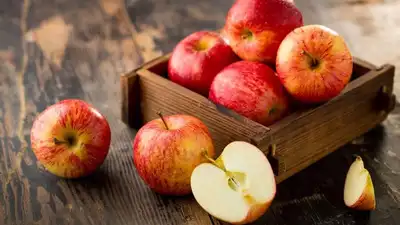
Research indicates that apples may possess anti-cancer properties due to compounds like triterpenoids, flavonoids, and polyphenols. Studies suggest these components can inhibit cancer cell growth and reduce the risk of various cancers, especially for smokers and heavy drinkers. Consuming flavonoid-rich foods, including apples, could protect against cancer and heart disease, though further research is needed.
Does your diet include apples? If not, it might be time to add some, because apples truly could save you a trip to your doctor’s office. We all have heard that apples can keep the doctors away, and it turns out to be just that! Along with the many health benefits of eating apples, some studies now hint at its anti-cancer properties.
Several compounds found in apples are linked to fighting cancer cells. A 2007 study by researchers at Cornell University found that triterpenoids, and several other compounds found in the apple peel, either inhibit or kill cancer cells in laboratory cultures. Yes, that’s right. Some apple peels a day, could decrease your risk of cancer.

"We found that several compounds have potent anti-proliferative activities against human liver, colon, and breast cancer cells and may be partially responsible for the anti-cancer activities of whole apples," Rui Hai Liu, Cornell associate professor of food science and the senior author of the study, said in a statement. Previously, Liu had identified that several compounds called phytochemicals, mainly flavonoids and phenolic acids found in apples and other foods, appear to have anti-cancer properties, including inhibiting tumor growth in human breast cancer cells.

A study by scientists from Germany, the University of Hawaii, and the University of Southern California found that the flavonol quercetin, which is found naturally in apples and onions, is beneficial in preventing and reducing the risk of pancreatic cancer.
A 2016 study found that an apple a day can reduce cancer risks because of the presence of flavonoids. The study suggested that polyphenols in apples might have the potential to reduce the risk of several forms of cancer formation and metastasis. The polyphenol phloretin in apples inhibits the growth of cancer cells through inhibition of the type 2 glucose transporter.

A 2019 study by researchers at Edith Cowan University found that consuming flavonoid-rich items such as apples and tea protects against cancer and heart disease, particularly for smokers and heavy drinkers.
They found that participants of the study who consumed 500mg of total flavonoids each day had the lowest risk of a cancer or heart disease-related death."It's important to consume a variety of different flavonoid compounds found in different plant-based foods and drinks. This is easily achievable through the diet: one cup of tea, one apple, one orange, 100g of blueberries, and 100g of broccoli would provide a wide range of flavonoid compounds and over 500mg of total flavonoids," lead researcher Dr Nicola Bondonno said.
Study Biotech & Health Tech Abroad: Top Courses at Harvard, Stanford
Another 2021 study observed that the anticancer effects of apples come from their phenolic compounds such as phloretin, quercetin and its glycosides, chlorogenic acid, catechin, and epicatechin. They also pointed out that the evidence suggests that triterpenoids, present mainly in apple skin, have significant chemopreventive and chemo-protective effects. "Apple phytochemicals provide many beneficial health effects and could work as a preventive tool in cancer," the study said, and the scientists added that further studies are required to confirm apple’s anticancer effects and bioavailability in humans.So feel free to munch on apples, this time knowing that the sweet treat is also reducing your risk of cancer.

 1 month ago
160
1 month ago
160




























 English (US)
English (US)